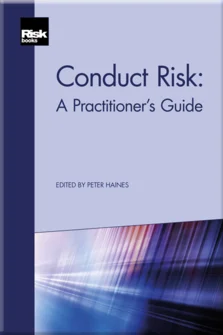Language and Conduct Risk: Limited Language – Big Blind Spots
Clare Payne
Introduction
An Overview of Conduct Risk
How Does Conduct Risk Manifest and What Are Its Root Causes?
What Are the Driving Forces of and Who Owns Conduct Risk?
Scope and Ownership within the Business
Conduct Risk in Financial Services: Lessons from the Hospitality and Leisure Industry
Ethical Culture: What, Why and How?
Language and Conduct Risk: Limited Language – Big Blind Spots
An Anthropological Perspective on Conduct Risk
Identifying and Measuring Conduct Risk
Risk Appetite Setting and Modelling Conduct Risk
The Effect of Conduct Risk Losses on Reputation
Bringing the Customer Back to the Foreground: The End of Conduct Risk?
Managing Conduct Risk
Closing Comments on the Future of Conduct Risk
This chapter explores the language of practices that encourage ethical work cultures, including storytelling, good decision-making and reflection. It discusses in detail language that can erode ethical work cultures, such as economic and financial discourse, acronyms, abstractions and borrowed terms, as well as their common use and potential impact. Finally, two Australian initiatives designed to address language and ethics – the Banking and Finance Oath and the Ethical Professional Program of The Ethics Centre – are profiled as industry-led initiatives with customer and community needs as a central concern.
INTRODUCTION
According to the Harvard Business Review,11 See https://hbr.org/2012/05/global-business-speaks-english. English is the global language of business. English is declared the working language of the World Bank22 See http://www.worldbank.org/en/language-resources. and the business language of globally recognised brands. This may be somewhat expected of organisations with their origins and headquarters in English-speaking countries. However, the acceptance and indeed formal declaration of English as the preferred working language of institutions such as the European
Copyright Infopro Digital Limited. All rights reserved.
As outlined in our terms and conditions, https://www.infopro-digital.com/terms-and-conditions/subscriptions/ (point 2.4), printing is limited to a single copy.
If you would like to purchase additional rights please email info@risk.net
Copyright Infopro Digital Limited. All rights reserved.
You may share this content using our article tools. As outlined in our terms and conditions, https://www.infopro-digital.com/terms-and-conditions/subscriptions/ (clause 2.4), an Authorised User may only make one copy of the materials for their own personal use. You must also comply with the restrictions in clause 2.5.
If you would like to purchase additional rights please email info@risk.net











